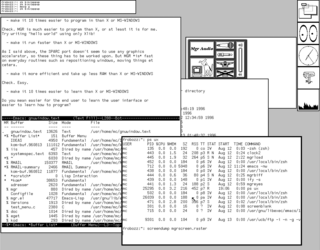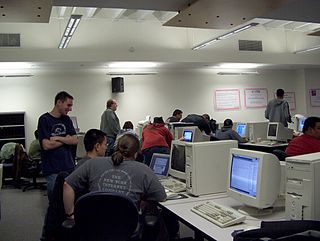
A bulletin board system (BBS), also called a computer bulletin board service (CBBS), is a computer server running software that allows users to connect to the system using a terminal program. Once logged in, the user performs functions such as uploading and downloading software and data, reading news and bulletins, and exchanging messages with other users through public message boards and sometimes via direct chatting. In the early 1980s, message networks such as FidoNet were developed to provide services such as NetMail, which is similar to internet-based email.
Flaming, also known as roasting, is the act of posting insults, often including profanity or other offensive language, on the internet. Flaming is distinct from trolling, which is the act of someone causing discord online or in person. Flaming emerges from the anonymity that Internet forums provide for users which allows them to act more aggressively. Anonymity can lead to disinhibition, which results in the swearing, offensive, and hostile language characteristic of flaming. Lack of social cues, less accountability of face-to-face communications, textual mediation, and deindividualization are also likely factors. Deliberate flaming is carried out by individuals known as flamers, which are specifically motivated to incite flaming. These users specialize in flaming and target specific aspects of a controversial conversation.
In computing, a file server is a computer attached to a network that provides a location for shared disk access, i.e. storage of computer files that can be accessed by workstations within a computer network. The term server highlights the role of the machine in the traditional client–server scheme, where the clients are the workstations using the storage. A file server does not normally perform computational tasks or run programs on behalf of its client workstations.
UUCP is a suite of computer programs and protocols allowing remote execution of commands and transfer of files, email and netnews between computers.

An Internet forum, or message board, is an online discussion site where people can hold conversations in the form of posted messages. They differ from chat rooms in that messages are often longer than one line of text, and are at least temporarily archived. Also, depending on the access level of a user or the forum set-up, a posted message might need to be approved by a moderator before it becomes publicly visible.
In Internet culture, a lurker is typically a member of an online community who observes, but does not participate by posting. The exact definition depends on context. Lurkers make up a large proportion of all users in online communities. Lurking allows users to learn the conventions of an online community before they participate, improving their socialization when they eventually "de-lurk". However, a lack of social contact while lurking sometimes causes loneliness or apathy among lurkers.

The Whole Earth 'Lectronic Link, normally shortened to The WELL or The Well, is a virtual community that was launched in 1985. It is one of the oldest continuously operating virtual communities. By 1993 it had 7,000 members, a staff of 12, and gross annual income of $2 million. A 1997 feature in Wired magazine called it "The world's most influential online community." In 2012, when it was last publicly offered for sale, it had 2,693 members. It is best known for its Internet forums, but also provides email, shell accounts, and web pages. Discussion topics are organized into conferences that cover broad areas of interest. User anonymity is prohibited.
ISCABBS, also known as ISCA, is a computer bulletin board system ("BBS"), formerly based at the University of Iowa. "Daves' own version of Citadel" (DOC), an early branch of the Citadel/UX BBS software, was developed to run ISCA. Like most Citadels, the focus is almost entirely on conversation among users.
This article outlines the general features commonly found in various Internet forum software packages. It highlights major features that the manager of a forum might want and should expect to be commonly available in different forum software. These comparisons do not include remotely hosted services which use their own proprietary software, rather than offering a package for download which webmasters can host by themselves.
The HKGolden is an Internet forum for topics related to computer hardware and software among Internet users in Hong Kong in the early 2000s. HKGolden has become an Internet community. The forum is a part of HKGolden.com, a computer information portal named after the Golden Computer Centre – a shopping centre of computer products in Sham Shui Po, Kowloon, Hong Kong. Since 2006, it has become a popular and general platform for all Hong Kong netizen. It was the concentration platform of funny and satirical derivative works. However, due to the poor management of the administrators, many users have left in 2016.

FirstClass is a client–server groupware, email, online conferencing, voice and fax services, and bulletin-board system for Windows, macOS, and Linux. FirstClass's primary markets are the higher-education and K-12 education sectors, including four of the top ten largest school districts in the United States.

Conversation threading is a feature used by many email clients, bulletin boards, newsgroups, and Internet forums in which the software aids the user by visually grouping messages with their replies. These groups are called a conversation, topic thread, or simply a thread. A discussion forum, e-mail client or news client is said to have a "conversation view", "threaded topics" or a "threaded mode" if messages can be grouped in this manner. An email thread is also sometimes called an email chain.

ManaGeR or MGR is an early windowing system originally designed and developed for Sun 2/120 workstations in 1984 by Stephen A. Uhler, then at Bellcore.
Asynchronous conferencing or asynchronous computer-mediated communication is the formal term used in science, in particular in computer-mediated communication, collaboration and learning, to describe technologies where there is a delay in interaction between contributors. It is used in contrast to synchronous conferencing, which refers to various "chat" systems in which users communicate simultaneously in "real time".
Especially in computer-mediated communication, it is emerging as a tool that can create opportunities for collaboration and support the inquiry process. In this form of communication, face-to-face conversation is not required, and the conversation can last for a long time. It has mostly been useful for online discussions and idea sharing which can be used for learning purpose or for solving problems over geographically diverse work-field.

Usenet, USENET, or, "in full", User's Network, is a worldwide distributed discussion system available on computers. It was developed from the general-purpose Unix-to-Unix Copy (UUCP) dial-up network architecture. Tom Truscott and Jim Ellis conceived the idea in 1979, and it was established in 1980. Users read and post messages to one or more topic categories, known as newsgroups. Usenet resembles a bulletin board system (BBS) in many respects and is the precursor to the Internet forums that have become widely used. Discussions are threaded, as with web forums and BBSes, though posts are stored on the server sequentially.

A Linux User Group or Linux Users' Group (LUG) or GNU/Linux User Group (GLUG) is a private, generally non-profit or not-for-profit organization that provides support and/or education for Linux users, particularly for inexperienced users. The term commonly refers to local groups that meet in person but is also used to refer to online support groups that may have members spread over a very wide area and that do not organize, or are not dependent on, physical meetings. Many LUGs encompass FreeBSD and other free-software / open source Unix-based operating systems.

FUDforum is a free and open-source Internet forum software, originally produced by Advanced Internet Designs Inc., that is now maintained by the user community. The name "FUDforum" is an abbreviation of Fast Uncompromising Discussion forum. It is comparable to other forum software. FUDforum is customizable and has a large feature set relative to other forum packages.
CONFER is one of the first computer conferencing systems. Highly sophisticated for its time, it was developed in 1975 at the University of Michigan by then graduate student Robert Parnes. The CONFER system continued to be a widely used communication tool until 1999. CONFER is the progenitor of the computer conferencing systems Caucus, PicoSpan, and YAPP.

Rodos is a real-time operating system for embedded systems and was designed for application domains demanding high dependability.










